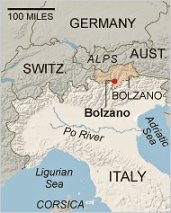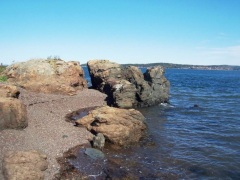
A wealth of international programs is just one of many reasons to enroll at Vermont Law School!
I recently returned from a trip to Bolzano, Italy where I made two presentations at the Winter School on Federalism and Fundamental Rights of the European Academy (EURAC) of Bolzano.
Students at the EURAC Winter School come from all over the world, including Ukraine, Tibet, India, Brazil, Nigeria, as well as from most countries of Western and Eastern Europe. Most have graduate degrees in political science, government, or a related field. To this group of very interesting students I gave one lecture on “Federalism and Fundamental Rights in the U.S.”
Since my lecture was near the end of the winter school, this generated several discussions comparing rights in the U.S. federal system with those of other countries. Faculty from the United Kingdom, Spain, Germany, and Switzerland presented on other topics pertaining to the general theme of federalism and fundamental rights.
On the last day of the winter school, I gave the closing, public lecture on the topic of “Race and Federalism in the U.S.” Most of the audience was not familiar with the sad history of racism in the U.S. and the effect that racial issues had on the development of our federal system from
the beginning. Thus, there was a lively discussion following my lecture.
Taking advantage of this visit to northern Italy, my wife and I spent a few days in Rome, arriving on the day that the Pope announc
ed his decision to retire. (We assume that was simply coincidence and not causation.) After doing a little sightseeing, we took a lovely, 4.5 hour train raid up to northern Italy, passing through Florence on the way. As we neared Trento and Bolzano, we were struck by the vineyards that fill the valleys of that area. We also had a chance to sample the delightful, local (and inexpensive) wines.
Upon leaving the train station in Bolzano, we thought we might have arrived in Austria or Germany because the town is very much Germanic in its appearance, unlike the other Italian cities we had passed through on our trip. It turns out that this is not at all surprising since before the end of World War I, Bolzano and the South Tyrol area of Italy were part of Austria. Today, approximately a third of the population is ethnic German. Most residents are bi-lingual and parents can have their children educated in either German-speaking or Italian-speaking schools.
A visit to Bolzano by VLS Professor Emeritus Richard Brooks some 15 years ago led to the creation of the VLS programs for study at the University of Trento, located south of Bolzano. Professor Brooks was visiting his daughter in Bolzano when he decided to visit the University of Trento to explore the possibility of exchange programs. As a result of that first visit, VLS students now take advantage of the opportunity to take a seminar or a semester in Italy for courses taught in English at the University of Trento.
The countryside surrounding Bolzano and Trento is truly beautiful and either city is a wonderful place to study, for a few weeks, a full semester, or longer.
VLS offers many other opportunities to study abroad—in China, England
, France, and Spain. These include short seminars, a semester or summer program, as well as dual degree programs. Full information about the broad international offerings at VLS can be found at http://www.vermontlaw.edu/Academics/International_and_Comparative_Law_Programs.htm
Gil Kujovich
Professor of Law


You must be logged in to post a comment.